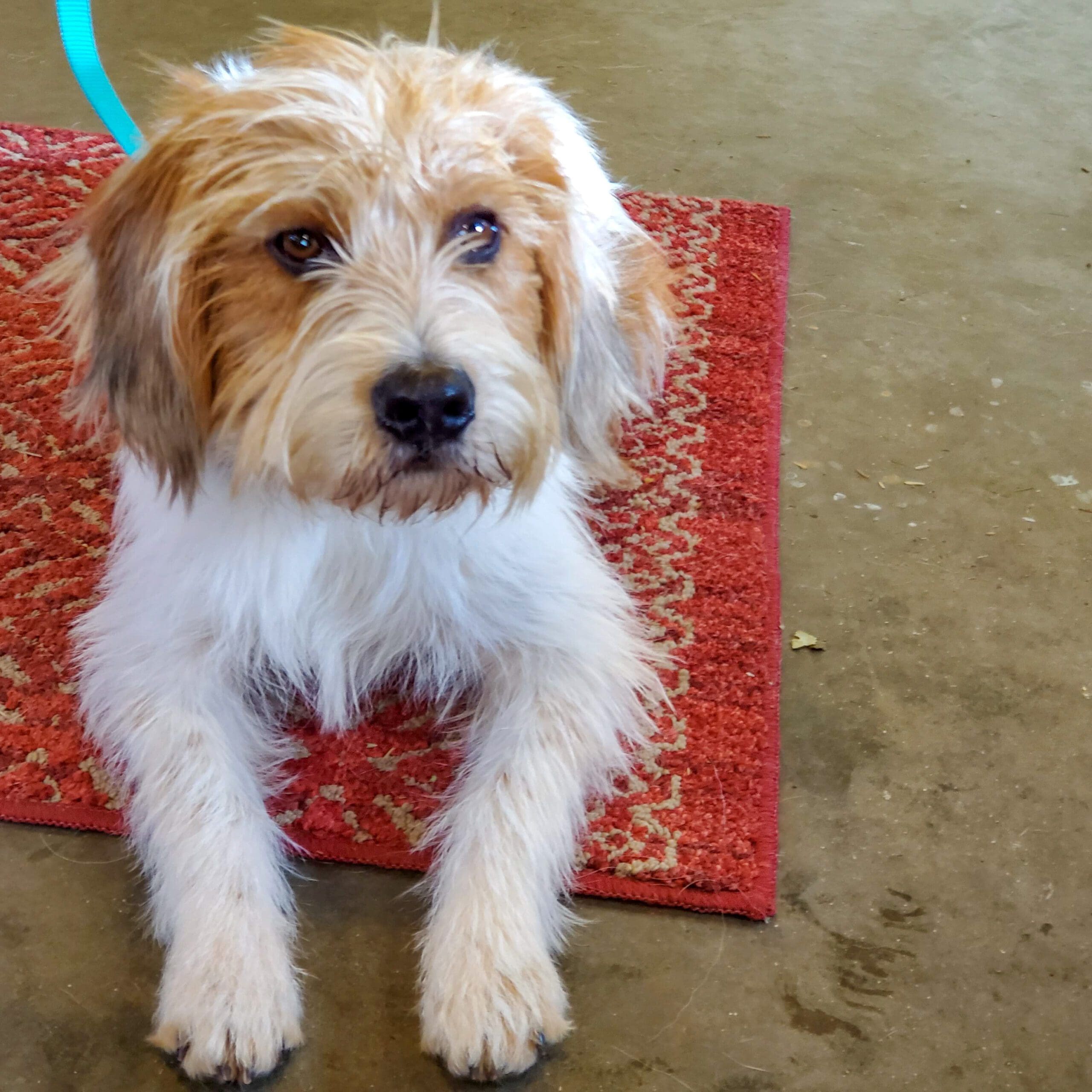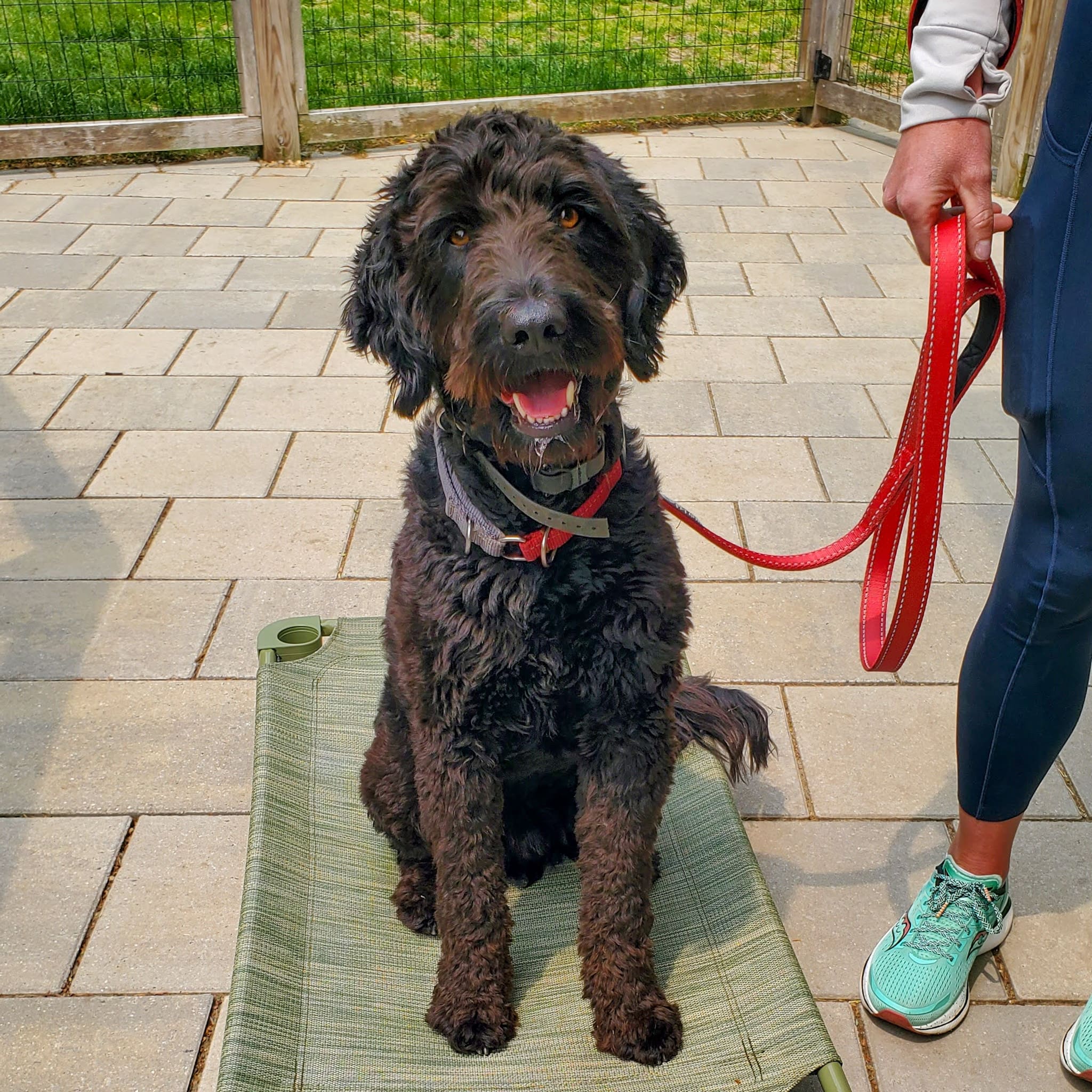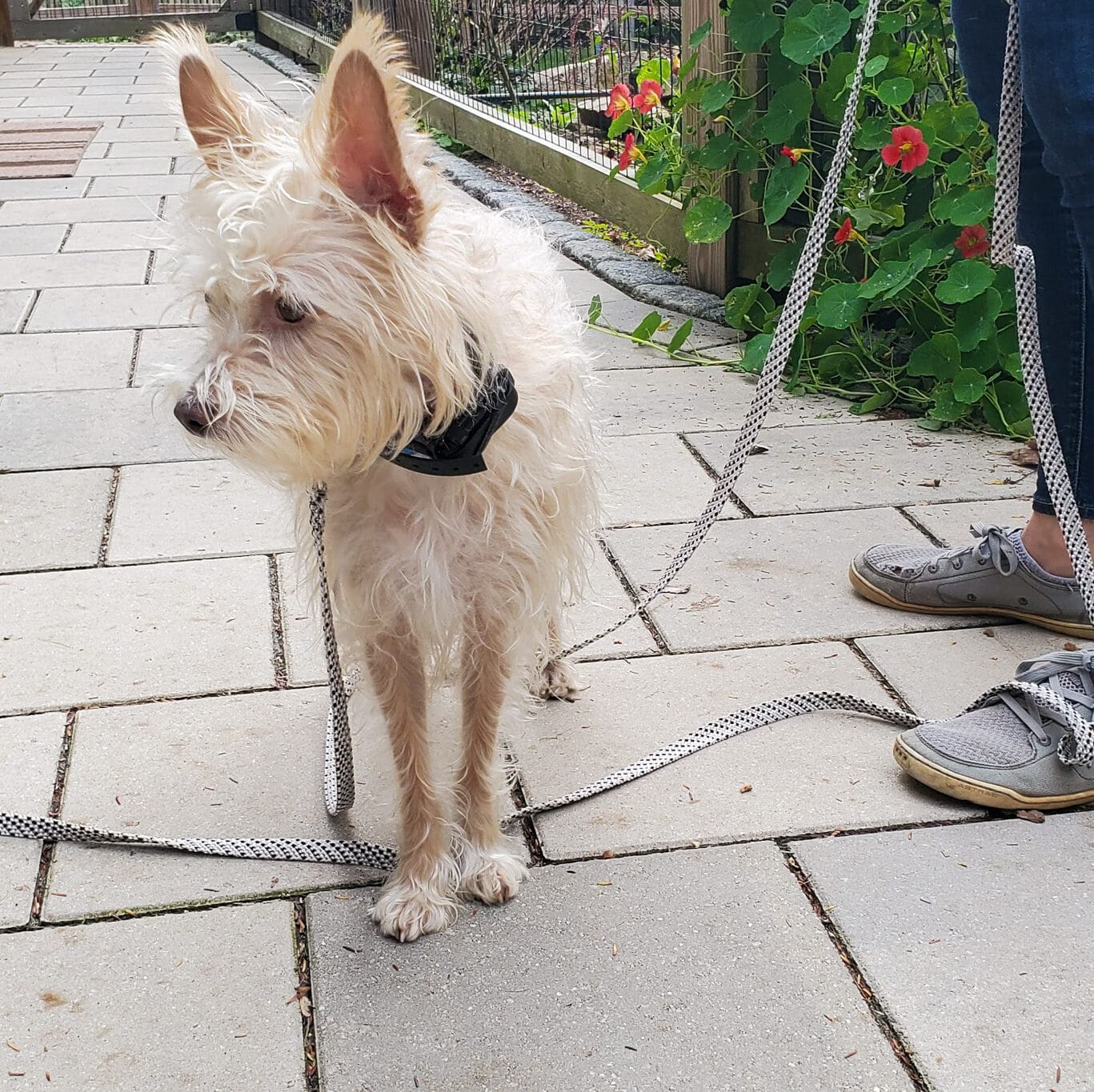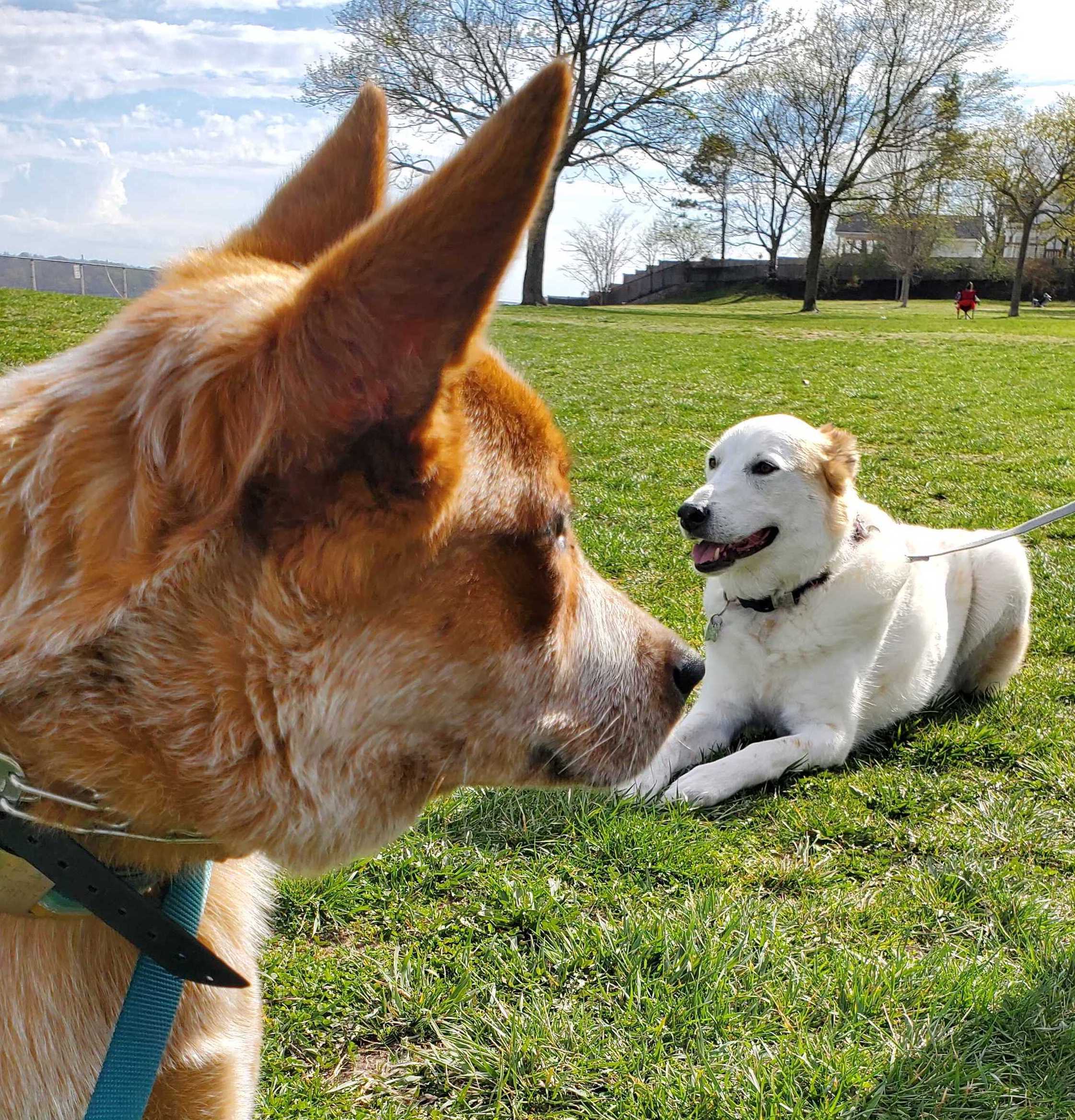Frequently Asked Questions (FAQs)
The following topics and information can answer some of the basic questions you may have about training your dog with Dog Coach. Click the topic to view questions and answers.
Prong Collars
Are prong collars safe?
Yes, when a prong collar is properly fitted and utilized, it is safe and humane. Dog Coach teaches you to use the least amount of leash pressure necessary to remain in control of your dog’s focus.
Why do you use prong collars in your training?
A prong collar is a misunderstood but highly humane and effective tool for communicating with your dog. The collar is fitted loose on the neck and works in tandem with a standard buckle collar. We teach a leash technique using a light pressure and release motion that allows you to tap into a flow of communication with your dog. Many times it is difficult for your dog to “hear” you if he is over-excited and not focused on what you are asking him to do. By applying our technique, it is typical to see a near immediate attention shift because the dog can now understand your expectations.
Proper use of a prong collar is also an efficient and humane way to train a dog to move through stressful anxious behaviors. Any out-of-control situation like pulling on a leash, jumping on guests, or excessive barking becomes behavior left behind. Gentle leash work with a prong collar reminds the dog of the boundaries you set, so your dog remains calm and eventually learns to choose better behaviors without reminders.
Do I have to use a prong collar if I work with you?
All dogs we work with 16 weeks and older are fitted with a Herm Sprenger prong collar. A micro-sized collar is fitted for a dog like a Chihuahua where a Mastiff would have a larger size. Learning proper use of a prong collar is required for all programs except Team Puppy training.
I already have a prong collar; can I get a discount?
While we are happy that you have purchased a prong collar, the Herm Sprenger prong collar with a quick-release buckle snap is included in the price of the training package. No discount is available.
Remote Collars
What is an e-collar?
An e-collar – also called a remote collar and short for electronic collar – is a dog training system that consists of a wireless remote and a wireless receiver. E-collars allow you to remotely send a signal to your dog to clearly communicate the difference between yes (good behavior) from no (bad behavior).
Why do you use e-collars for dog training?
When recommended, Dog Coach teaches e-collar training for the fastest, most effective way to teach your dog to pay attention to your commands. Remote collars are also an excellent way to promote an all-important calm and stable state of mind for your dog. Dogs look to owners to set parameters for good behavior in the clearest way possible so they can follow through on the basic expectations we hold for them. This can be done through the e-collar signal used as an extension of your commands. The Dog Coach Remote Collar Program trains owners to understand and anticipate their dog’s excitement level and teaches a humane and appropriate response.
Are e-collars safe?
Yes, remote collars are safe and utilize similar technology used in human physical therapy practice for muscle stimulation. We exclusively use remote collars made by E-Collar Technologies. The brand offers a unique calibration with the lowest level signal not even detectable on human skin but effective for training dogs. The signal becomes a virtual leash that allows excellent and safe communication. We have found that other branded remote collars can be calibrated too high or with inconsistent delivery of signal. Collars from E-Collar Technologies are the best calibrated remote collars for training family dogs. You can read more on their website and on our blog.
I already own an e-collar, can I use it?
We are happy to work with owner-supplied E-Collar Technologies collars. We offer an equipment discount for supplying your own remote collar.
Will the e-collar help with barking and whining?
Training your dog to recognize and understand the meaning of the low-level e-collar signal allows any handler in the family to convey a precise and appropriate signal to stop unwanted behaviors, from barking and whining to jumping and pulling.
Is the remote collar waterproof?
E-Collar Technologies collars are water resistant and can safely be used in the rain, on the water, and while your dog is swimming. The collar does not float however.
Do you use tone or vibrate to train dogs?
We exclusively work with the e-collar signal function and do not train using tone or vibrate. Neither tone nor vibrate have different levels to respond to the highly variable excitement of certain dogs. We show you the effectiveness of the wide signal range the collar offers to communicate clearly with your dog.
Is an e-collar a shock collar?
Historically, electronic collars delivered a much higher signal to the dog. When the term “shock” is used, the concept of the collar is misunderstood. E-Collar Technologies collars allow the delivery of low-level signal that can be undetected by the human hand. It is just a slight stim to remind your dog to pay attention or knock off the poor behavior. With consistent and appropriate low-level use, dogs make better behavior choices and the need to give any e-collar signal is reduced.
Training Style
How would you describe the training you offer?
Dog Coach offers balanced dog training, giving you the tools to build a better relationship with your dog by becoming the calm, assertive leader your dog needs. We do this through incorporating specialized techniques along with full crate training, prong collars, slip leads, and remote collars to teach basic obedience for family dogs.
What is balanced dog training?
Balanced Dog Training is teaching your dog the boundaries of good behavior through both ‘No’ (correction) and ‘Good’ (praise). The term balanced refers to the need for both exercise AND controlled calm; play WITH attention and respect. Balanced training also applies appropriate tools to meet the training needs of each specific dog. Our tools include prong collars, slip leads, leashes, standard collars, remote collars, and dog crates. Our strategies and techniques are always centered around encouraging your patience and teaching your dog a calm state of mind. And with all that, you get more fun with your dog!
I have tried other trainers before and didn’t get the results I desired. What makes your program and approach different and more effective?
Since we have discussed your training objectives prior to working with you we become committed partners in creating a well-behaved family dog. Every issue you identify is addressed in training, with follow-through exercises outlined in detail which expands your knowledge and improves your leadership in dog handling. The multiple sessions of our programs allow a one-on-one focus that has excellent results in achieving our clients’ objectives. Nurturing your dog is an ongoing process of consistently applying training strategies to promote best behaviors.
Treats
Are treats or food part of your training?
While treats for training will work for some dogs to attain better behavior, not all dogs respond in a positive way to learning in this manner. Our feeling is if treats have worked for you and your dog in promoting good manners, that’s great!
We use treats in a limited way for a variety of reasons. In our experience, consistent treats become a distraction for most dogs rather than an actual training tool. Treats tend to energize dogs instead of settling them down for learning. We teach you why your dog is better off calm and focused. We do use food as part of a training strategy; a routine for mealtime feeding offers a powerful training opportunity. Establishing a state of mind at mealtime that is calm and unexcited can have a remarkable amount of influence on your success. Watch our video about feeding to learn more.
What To Expect
What should I expect at my first session?
Upon arrival at our training barn or when the trainer arrives at your home, please have your dog on a standard buckle collar and leash. The first session of the program begins with getting to know you, your family, and your dog. After some conversation, we dive directly into working with you and your dog.
After each session we give you a lesson sheet that recaps that day’s session. If not all family members are able to be present, the lesson sheet can be shared at home for practice between sessions.
Should everyone in my family come to training?
We offer family-centered dog training, meaning we encourage all family members to participate in the training process. However, it may be helpful to have childcare in place for the training dates. Our 1-hour lessons can usually accommodate all but the youngest age children. Whether or not every family member can be present for the training sessions, the full support of your family will make a huge positive impact on your dog training results.
How do I know what program to pick?
The first step in deciding if you are interested in working with Dog Coach is to read through our program pages and pricing. If you like what you read, we invite you to fill out our 20-question Get Started form and book a no-obligation 30-minute call with a trainer. On that call, you can review the challenges you’re having with your dog, get your questions answered, learn more about our process, and receive program and training recommendations.
What Times are Sessions Scheduled?
We offer training Tuesday through Friday, with the first session starting at 9:30 am and the last session finishing at 6 pm, based on availability. Saturdays we are available 9:30-3:30.
Services
Do you offer boarding?
Dog Coach does not offer traditional boarding. We extend invitations for Overnight Training to eligible clients who have successfully completed remote collar training with us. You can read more about our program under Advanced Training.
Do you offer doggy daycare?
Dog Coach does not offer a drop-off daycare program. Day Training is an invitation-based program for eligible dogs and owners who have completed remote collar training with us. You can read more about our program under Advanced Training.
Aggression & Reactivity
Do you work with aggressive dogs?
We work on a case-by-case basis with dogs with moderate aggression who may have a bite history with a person or another dog. In some cases, aggressive dogs require more than can be accomplished in the owner-based training lessons we offer. We encourage you to contact us to discuss your issues and available training options.
What is reactivity in dogs?
A “reactive dog” is simply one that overreacts to other dogs, people, animals, or objects. Terms like “leash reactivity” and “dog reactive” attempt to describe the specific behavior of the canine. Dog Coach balanced training techniques directly address moderate reactivity and, with practice, can have great results in having dogs walk nicely on-leash and overcome distractions that previously triggered excessive behavior.
Anxiety & Nervousness
Does your training work for nervous, anxious, or shy dogs?
Dog Coach training teaches owners to be calm and confident leaders which is just what nervous dogs need most. The balanced training we offer is well-suited for shy, nervous, anxious, or overexcited dogs.
Crate Training
Do I have to use a crate?
All dogs are den animals and a dog feels safe and secure in their den. With training, proper use of a dog crate teaches your dog a calm state of mind that is essential to calm behavior out in the world of high distractions. It is recommended to have a properly sized dog crate before your first session. All Dog Coach clients achieve success with full crate training for their dogs.
What is Full Crate Training?
Full crate training is teaching your dog to self-settle in their dog crate with the door closed whenever you place your dog in the crate for a nap or nighttime sleep. We help you establish a canine-appropriate and humane crate schedule to teach your dog the calmness you want for your family dog. Full crate training is a process of gradually increasing the time spent relaxing in the dog crate. Read more about Full Crate Training.
Is a pen or isolated room a substitute for a dog crate?
While a pen or other options without a top can be helpful tools to manage a young dog, they do not offer the same training features of a closed-door wire dog crate that we recommend.
Training Options
Do you work with multi-dog households?
We do work with multi-dog situations. At times it’s appropriate to focus training on one dog so that later you can apply the lessons to both dogs. Other times it is appropriate to simultaneously work with your other dog(s). We offer some programs at half price for your second dog. Please inquire.
Do you do training for working dogs like service, therapy or other specialized tasks or tests?
We do not offer standardized or specific testing. Dog Coach offers obedience training that enables you to work toward the goal of having a well-rounded, polite, quiet dog that can go anywhere with you. Many dogs we train go on to more specialized training. We invite you to contact us to discuss the specific goals for your family dog.
My dog is difficult to walk, pulling, lunging, barking, and growling at other dogs. Is it possible to ever have a pleasant walk with him?
Our training techniques demonstrate how to have a better all-around relationship with your dog, so going for a walk becomes a pleasant part of your day. Before leaving the house, you should be able to keep your dog in a stable state of mind. If a dog is unable to be calm and relaxed before you go out the door, it will be very difficult if not impossible for you to establish calmness and good manners out on the walk where there are many more distractions. Learning to recognize and stop over-excitement whenever it happens is crucial for a pleasant dog walk. Read more about walks.
About Dog Coach
What does Dog Coach believe/ stand for?
Dog Coach believes in teaching dog handling skills to help owners become the calm, confident leader that all dogs need and deserve. The skills and leadership learned in Dog Coach programs promote more fun in day-to-day life with your dog. We build long-term relationships with clients and their families and offer continuing support on the dog training journey.
Is there a guarantee with your training? If I have problems or questions in a year from now, will you be there to help me?
When you commit to transforming your dog with Dog Coach training, we join your family team and make your success our utmost priority. Since we track your progress throughout our programs, we share a commitment to see your dog make major improvement. We are in weekly discussion with you about your progress. As all outcomes are dependent on many variables, like consistent practice and full family support of your objectives, it is unethical for us to offer a 100% guarantee. Our clients regularly see excellent results in transforming their dogs’ behavior with our training, which you can read about here.
Dog Coach will remain on your team to help you manage your dog with follow through advice, professional referrals, and additional resource recommendations for the life of your dog.
What is the service area where you see clients?
Dog Coach is located north of Boston, MA serving the communities of Swampscott, Marblehead, Salem, Peabody, Wakefield, Lynnfield, Reading, Middleton, Danvers, Beverly, Manchester-by-the-Sea, Gloucester, Rockport, Essex, Ipswich, Georgetown, Boxford, Topsfield, and Hamilton-Wenham.
We also routinely draw clients to our facility from North Reading, Lynn, Revere, Winthrop, Saugus, Melrose, Medford, Haverhill, Newburyport, North Andover, and beyond.




